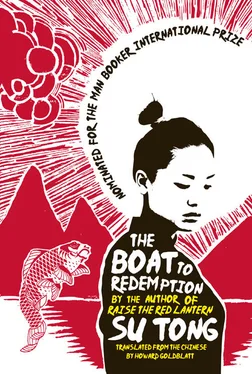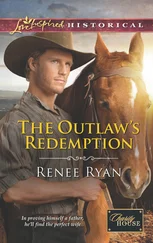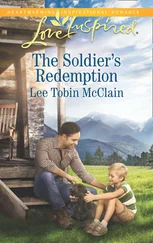‘This is valuable property,’ he said, and I hear they’re going to build a car park. There are so many vehicles in Milltown these days — oil trucks, agricultural transports, even military vehicles — so parking is at a premium.’
‘What’s more important,’ I demanded, ‘a car park or a memorial to a revolutionary martyr?’ It was a delicate question, but I was asking the wrong person. So I softened my tone and asked, ‘What about the memorial stone? Where did they tell you to move it to?’
‘It’s only a stone marker,’ he said, ‘and a tomb with some personal effects. Easy to move. I’m told it’s going to the revolutionary museum in Phoenix.’
My distress mystified the worker. He looked me over carefully, taking in my bag, my clothes and my leather shoes, but he couldn’t figure out who I might be. ‘Who are you, anyway?’ he asked.
I nearly blurted out, ‘I’m the martyr Deng Shaoxiang’s grandson!’ But I bit my tongue. The river flows east for thirty years, then west for thirty more. Now I couldn’t say whose grandson I was. With a sigh I said, ‘I’m nobody, nobody at all. Just a rank-and-file citizen. I was curious, that’s all.’
‘After raising such a stink, now you tell me.’ The worker breathed a sigh of relief. ‘Why’d you get so angry with me? We’re both rank-and-file citizens, so you shouldn’t be asking me questions like that. Go and ask one of the big shots.’
He was right, this was a matter for the big shots. That excluded me, and I had no reason to make trouble for an ordinary worker. I walked back to the pavilion and pulled back part of the plastic to look inside. The smell of alcohol hit me in the face. The man wasn’t alone. Two other workers were asleep on the floor. The remains of a meal lay on an old newspaper, and a pair of geese were picking their way through the lunch boxes and drink bottles. Then I caught sight of a man watching the geese — it was the idiot Bianjin, sitting in a corner, holding a baby goose in his arms as he gnawed on a pig’s foot.
The sight of Bianjin called to mind his backside, and that reminded me of my father’s backside, with its fish-shaped birthmark. He had to contend for his birthright with an idiot, a bizarre struggle that had gone on for years and that could only be classified as humiliation. I had no interest in being around Bianjin. My fear of being subjected to comparative scrutiny was like a conditioned reflex. There were plenty of muddle-headed people on the shore and on the barges who would be thrilled at the prospect of discussing our relative appearance and bloodlines if they saw me together with Bianjin. Who were the real descendants of Deng Shaoxiang — Ku Wenxuan and his son, or the idiot Bianjin? Most of the boat people leaned towards us, while people on the shore tended to favour the underdog by insisting that the idiot’s birthmark more closely resembled a fish. And there were even people who passionately argued that they’d prefer an idiot to be the martyr’s descendant than the degenerate Ku Wenxuan, who would smear the legacy of Deng Shaoxiang.
I stood outside the pavilion observing Bianjin, while several townspeople watched me from a nearby tea stall. The sight of me and the idiot in the same place had them virtually jumping for joy. ‘Look!’ they said. ‘There’s the idiot, and there’s Ku Dongliang!’ They were all talking at once, the topic of discussion, believe it or not, my backside. Some of them were unable to contain their desire to have a peek; their eyes were nearly burning a hole in the seat of my pants. Baldy Chen’s cousin, Four-Eyes Chen, who wore glasses, appeared to be cultured and educated, but he came up, grabbed my arm and made a presumptuous request: ‘Ku Dongliang, your father never comes down off his barge, so his backside is off limits. Why don’t you show what you’re made of by dropping your pants and letting us compare your birthmark with the idiot’s? That way the masses can fairly judge whether you are Deng Shaoxiang’s grandson.’
Four-Eyes was courting disaster. He was no match for me in an argument or in a fight, but I had no desire to get tangled up with this bunch. ‘Get the hell out of here, Four-Eyes, and send your wife over. I’ll give her a look, front and back. She can tell you what she sees.’ My parting shot. A foreboding chill swirling in the early-evening air above Milltown gave me the feeling that this was not the place for me. I had to leave, and leave fast.
A number of oil transports were parked by the side of the road, one of which had just started up. The driver, assuming I was looking for a ride, waved at me from the cab. ‘Where you headed? Hurry up, jump in.’ I ran over and jumped on to the running board. ‘I’m going to Xingfu,’ the driver said. ‘I can drop you off on the way if that’s where you’re headed. It’ll cost you fifty cents.’
I didn’t know exactly where Xingfu was, whether it was a rural village or a market town. But so what! Xingfu — Happiness — a nice name. ‘Xingfu it is. Let’s go.’
The driver opened the passenger door and stretched out his hand. ‘Fifty cents, up front.’
I was digging in my pocket for the money when a strange voice whistled past my ear. There was a commotion at the intersection, with several people calling my name. ‘Stay there, Ku Dongliang! Don’t leave, don’t go anywhere!’ Some kids who’d come running over from the Sunnyside Fleet were calling my name, and they surrounded me like a swarm of hornets. One of them wrapped his arms around my legs, another grabbed my bag. Xiaofu stamped his foot and yelled at me, ‘Ku Dongliang, while you’ve been having a carefree time out here, your dad swallowed some pesticide. They’ve taken him to hospital.’
I had a dim image of Baldy Chen and his rifle, a delayed bullet emerging from the barrel and hitting me in the chest, the bad news arriving mercilessly. I shuddered, jumped down off the running board and ran as fast as I could towards the hospital, arms flailing. I thought I was flying down the road, but then my hip started aching, my legs felt rubbery and I started gasping for breath. I slowed down in spite of myself.
Xiaofu, who was off to my left, yelled, ‘Come on, run! Your dad’s in hospital fighting for his life, and you’re moving like a fat old pig.’
Chungeng, to my right, joined in. ‘It’s all your fault. A real man has the guts to take the heat for what he’s done. What kind of man are you? Are you scared now? You drove your own dad to suicide, but you’re like a turtle that pulls in its head. A turtle runs faster than you!’
Six-Fingers Wang’s youngest daughter, Little Four, was urging me on from behind by smacking my rear end with a switch, as if she was whipping a horse. ‘Get moving!’ she said. ‘You have to do something to atone for your crimes.’ She was panting and cursing at the same time. ‘Ku Dongliang, no matter what you think of him, he’s still your dad. People only have one father and one mother, and when they’re gone, they’re gone. But you abandoned your dad and ran off! If my mother hadn’t swallowed pesticide once and my father didn’t have such a good nose, your dad would have died in his cabin without anybody knowing anything about it.’
Her words hit me hard. I was crying like a baby as I ran. Those kids had never seen me cry, and it stopped them in their tracks. I covered my face with my hands so they wouldn’t see my tears. They thought it was their scolding and pressure that had brought on the tears, so they stopped. ‘Don’t cry,’ Little Four said, ‘we won’t say any more. So you were wrong this time. Next time you’ll do better.’
With a frown, Chungeng said, ‘What good does it do to cry? The harder you cry, the slower you run.’
People out on the street gaped curiously at this contingent on the run. ‘Hey!’ they said. ‘What’s the hurry? Has someone in the fleet died?’
Читать дальше












